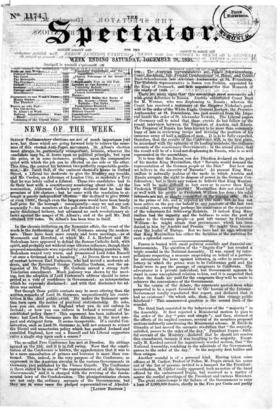The so-called Free Conference has met at Dresden. Its sittings
opened on the 23d, and it is in full swing. Now that the consti- tution of the Conference is known, the apprehension that it was to be a mere consultation of princes and bureaux is more than con- firmed. This, indeed, is the very purpose .of the Conference, as expressed in the Austrian circular to the various Governments in Germany, just published by the Vienna Gazette. The Conference is there stated to be one of " the representatives of all the German Governments," and it is charged with the revising of the funda- -niental laws of the Confederation. The plenipotentiaries chosen are not only the ordinary servants of the Governments, but they are in some eases the pledged representatives of Absolnt- mid r 0. A 11.,;
VOTi
nol-Schon welt r to :Ass tershUrg. • Vitalbtuifivipresentative is Baron von Peohlin, appointed by. the King of Denmark, alp:Hilts) insigatiasterrfor that Monarch of tl e9 tikketrof 1849. - IL ii toi 911i bar> YJIi..t) 11 j Itheitlq* amen that thiat'aiefibilsbytitedidnet neeessairelp44 with L;reet.defefeiice tdItusSial' stib*d Count End for M. Werner, who was displeasing to Russia ; whereas the Count has received a testinienyt: the Emperor Nicholas's good- will in the order of the White Eagle., General Rochtliv,.the Prussian Ambassador at St. Petersburg, has just received Asia:the Impe- rial hands the order of St. Alexander Newski. The Liberal papers of Germany call to mind thst,..these events do but follow up the recent interview, between the "Emperors of Austria and Russia. The Emperor of Russia has been known to be" tiore than commonly busy of late in reviewing troops and revising the position of his immense army of halfa.milhen-of,iten.A., e be fully expected, be accordant with'the oPinItgiVef its einber.s",.the ordinary therefore, that the resnIta'iiithe.Copfe'rechgbi in the first place, servants of the reaction Governments in the second place, that
the result will be of a kinduot displeasing to Russia, who is so well represented in the assemblage,
It is true that the.Baron von der Pfordten declared on the part of -his master King Maximilian, that " Bavaria would demand the representation of the German people at the Diet." But how can we believe in the sincerity "of Bavaria.? At present King Max- imilian is naturally jealous of the mode in, which Austria and Russia arrogate the right to dispose of power in the German Con- federation ; but is there any reason to believe that King Maxiiiii= lian will be more difficult to buy over or to coerce than King Frederick WilliainhaS proved? Maximilian does not stand hall so `well with his people as Frederick William has done ; his solid intereets-are not so clearly committed sinAke, side. .He is in the prime of hfe,'tit he has not been active on the popular behalf in any juncture of the last two eventful years, excepting, perhaps his connivance at the departure- Of the volunteers for Schleswig-Holstein. If indeed King Max- imilian had the sagacity and the boldness to seize the poet a leader to the German people—a post left vacant by Frederick William—he might attain that preeminence which has. hien- denied to him by Austria and Prussia. lie might thus becoine even the leader of Europe. But we have had no sign whatevet that King Maximilian has either the faculties or the ambition for such a splendid career.


























